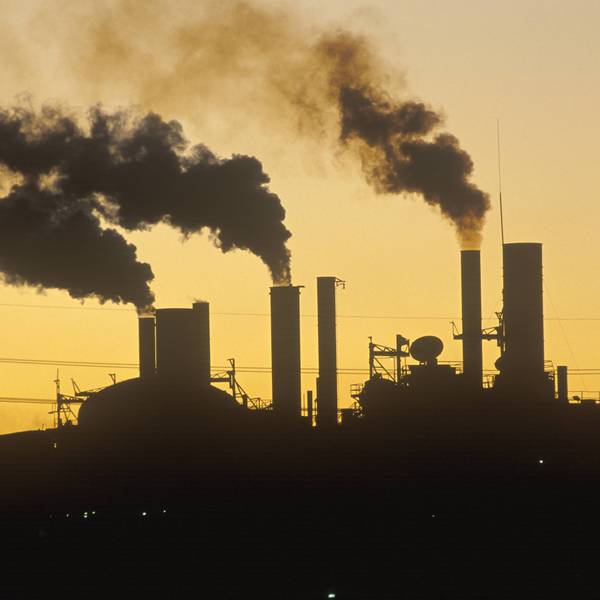President Trump is culpable in the preventable deaths of tens of thousands of Americans due to the evisceration of environmental protections. The deregulatory attack against the standards on mercury, soot and carbon dioxide alone will lead to 245,500 preventable deaths over a ten-year period--a calculation based on EPA staff estimates. This is more than the population of the city of Norfolk, VA or Boise, ID. The Trump administration--not state governors, not Congress, and not past presidents--is directly responsible for these preventable deaths. These deaths are in addition to the preventable deaths of tens of thousands of other Americans due to Trump's disastrous response to the COVID-19 pandemic (see Murderer in Chief: Donald Trump and the Tens of Thousands of Coronavirus Dead).
The Trump administration has initiated a broad offensive against regulatory protections. The Brookings Institute keeps an up-to-date compendium of Trump's deregulatory efforts entitled "Tracking Deregulation in the Trump Era" including those involving the environment, COVID-19, labor, health, finance, housing, agriculture, education and more. The administration has initiated more than 230 deregulatory actions so far. The New York Times keeps another list focusing on environmental deregulation entitled "The Trump Administration Is Reversing One Hundred Environmental Rules."
This article will focus on just four major attacks on environmental protections initiated by the Trump Administration. Three of the attacks have significantly weakened the standards for soot, mercury and carbon dioxide. I chose these three because EPA staff has actually estimated the number of deaths that will occur due to the roll back of each of these protections. In addition, I will examine the administration's unprecedented suspension of all environmental regulations/enforcement under cover of the COVID-19 pandemic. This suspension gives corporations control over major environmental decisions. The administration's deregulatory offensive reflects a value system that literally prioritizes corporate profits over American lives.
Weakening Mercury & Air Toxic Standards: 110,000 Preventable Deaths over a Ten-Year Period
Mercury is a neurotoxin that causes brain and nervous-system damage and decreased I.Q. and reasoning ability in children. In adults, mercury pollution causes heart disease; muscle weakness; and impairment of speech, hearing, and walking ability. Before the Mercury & Air Toxics Standards (MATS) was established in 2012, coal fired electric plants accounted for half of the human-made emissions of mercury and the majority of many other hazardous pollutants
- MATS saves 11,000 lives a year. The EPA calculated that the mercury emitted by coal plants fell by 80% since the MATS standard was adopted and prevented 11,000 premature deaths each year.
- A study in corporate cronyism - EPA administrator is former coal industry lobbyist. The Trump administration's effort to rescind MATS was led by Andrew Wheeler, the administrator of the Environmental Protection Agency. According to opensecrets.org, Wheeler was a former energy industry lobbyist whose biggest client was Murray Energy, a major coal producer. A NY Times article revealed that Robert Murray - the former chief executive of Murray Energy Corporation and a major fundraiser for Trump - "personally requested the [MATS] rollback in a written 'wish list' to top officials shortly after the president took office." The entire coal industry and the U.S. Chamber of Commerce also supported this deregulatory effort.
- Devaluing lives, valuing profits. An April 16, 2020 NY Times analysis stated, "The weakening of the mercury rule would be one of the most significant regulatory rollbacks engineered by the Trump administration." The story of how the administration subverted MATS is a story of devaluing lives. In 2016, the EPA calculated that the benefits of MATS far outweighed the regulatory costs. While the reduced mercury emissions alone would only save $6 million a year in direct benefits, the equipment needed to reduce mercury also reduced soot, lead, arsenic and other pollutants listed as hazardous in the Clean Air Act. The EPA calculated that reducing all these pollutants- called co-benefits - would prevent 11,000 premature deaths, 4,700 heart attacks and 130,000 asthma attacks every year. The total benefits would amount to $80 billion over five years - far outweighing the $9.6 billion in compliance costs. In an effort to rationalize its decision to undermine MATS, the Trump EPA issued a new order that eliminated the inclusion of "co-benefits" in the total cost-benefit analysis. Thus, the only benefit of MATS recognized by the Trump EPA amounted to $6 million while the compliance cost was $9.6 billion. This new method of calculating benefits has far-reaching consequences. Based on statements made by environmental lawyers, the previously cited NY Times analysis concludes, "By reducing the positive health effects of regulations on paper and raising their economic costs, the new method could be used to justify loosening restrictions on any pollutant that the fossil fuel industry has deemed too costly to control."
Refusal to Strengthen Soot Standard: 121,500 Preventable Deaths over a Ten-Year Period
Soot is composed of a number of very fine particulates that are primarily produced by the burning of fossil fuels, especially coal. Soot contains a variety of pollutants including chemicals, acids, metals, soils, and dust that are suspended in the air after emission. Soot is one of the worst forms of air pollution that, according to the EPA, penetrates deep into the lungs and has been linked to a wide range of serious health effects, including premature death, heart attacks, and strokes, as well as acute bronchitis and aggravated asthma among children.
EPA staff recommends a stronger standard that would save 12,150 lives per year. In September 2019, EPA staff released a draft 457-page scientific assessment. The staff recommended a 25% strengthening of the current soot standard which would save 12,150 lives a year.
Trump rejects stronger standard after opposition from corporations. After publication of the draft EPA staff assessment, 13 industry groups, including the American Petroleum Institute, the U.S. Chamber of Commerce, the National Mining Association and the Alliance of Automobile Manufacturers, in a November 2019 public comment, concluded that the "EPA staff should revise its recommendation to the [EPA] Administrator...to a recommendation for retention of the present standards." The Trump administration followed the corporation, not staff, recommendations.
Stronger standard rejected even after major study links air pollution to higher COVID-19 deaths. The timing of the EPA's announcement that it was rejecting the staff recommendation illustrates the administration's values and priorities. The announcement came a week after the release of a major study that showed a link between long-term exposure to air pollution and COVID-19 death rates. The study found that a person living for decades in a county with high levels of fine particulate matter is fifteen percent more likely to die from COVID-19 than someone in a region with one unit less of the fine particulate pollution. The study concluded that "our results underscore the importance of continuing to enforce existing air pollution regulations to protect human health both during and after the COVID-19 crisis." The Washington Post quoted a senior author of the study, Harvard biostatistician Francesca Dominici, "If you're breathing polluted air and your lungs are inflamed by the disease, you're going to get very, very sick...Now is not the time to be rolling back environmental regulations."
Replacement of Limits on CO2 Emissions: 14,000 Preventable Deaths Over a Ten-Year Period
In 2015, President Obama announced the Clean Power Plan (CPP) that set the first-ever standards on carbon pollution emitted from U.S. power plants - the largest source of carbon pollution in the U.S. According to the EPA, carbon dioxide (CO2) is the most prevalent greenhouse gas pollutant, accounting for nearly three-quarters of global greenhouse gas emissions and 82 percent of U.S. greenhouse gas emissions. The CPP would ensure that fossil-fuel based power plants would emit less carbon. It also created incentives for power plants to replace carbon-based sources of energy with renewable sources.
- Obama's CO2 standards would prevent 3,600 deaths per year. The EPA estimated that the Plan would reduce carbon pollution by 32%; sulfur dioxide pollution by 90% and nitrogen oxide by 72%, all relative to 2005 levels. The CPP would prevent 3,600 premature deaths, 1,700 heart attacks, and 90,000 asthma attacks. Implementation of the CPP was to begin in 2016 and become fully operational by 2030
- Corporate opposition and an unusual Supreme Court decision doomed the Clean Power Plan CO2 standards. Corporate opposition to the proposed Clean Power Plan was swift and coordinated. Their offensive was led by major oil and gas, coal and utility corporations as well as the U.S. Chamber of Commerce and the American Legislative Exchange Council (a Koch brothers funded group). These corporations quickly filed and/or supported legal challenges to the CPP. Corporate opponents were also successful in generating political opposition as 27 states sued the EPA. In 2016, in an unusual 5-4 ruling, the Supreme Court voted along ideological grounds to stay the Clean Power Plan and allow state lawsuits to proceed, preventing it from ever going into effect.
- Trump's replacement plan would result in 1,400 additional preventable deaths per year and lead to significant increases in CO2 emissions. The Trump administration developed the Affordable Clean Energy Rule (ACE) to replace the Clean Power Plan. ACE was tailored to please the fossil fuel industry. Indeed, Vox reported that the Trump EPA proposal could actually lead to a significant increase in carbon dioxide emissions and preventable deaths--as many as 1,400 more deaths per year by 2030
The Trump Administration is Using the Pandemic as an Excuse for Wholesale Deregulation
In an unprecedented move, on March 26, 2020, the Trump EPA suspended the enforcement of U.S. environmental laws. This blanket policy represents a direct power grab by the administration and private corporations because the EPA already possesses the ability to be flexible when extraordinary circumstances arise.
- Trump administration announces unprecedented suspension of environmental monitory, testing, and penalties citing pandemic. The EPA issued a stunning order announcing that it "does not expect to seek penalties for violations of routine compliance monitoring, integrity testing, sampling, laboratory analysis, training, and reporting or certification obligations in situations where the EPA agrees that COVID-19 was the cause of the noncompliance and the entity provides supporting documentation to the EPA upon request." Cynthia Giles, the former head of the EPA's Office of Enforcement under Obama, was quoted in a March 27th article in The Hill, "It tells companies across the country that they will not face enforcement even if they emit unlawful air and water pollution in violation of environmental laws, so long as they claim that those failures are in some way 'caused' by the virus pandemic. And it allows them an out on monitoring too, so we may never know how bad the violating pollution was." The rule is in place indefinitely
- Trump deregulatory action follows recommendations made by big energy corporations. This unprecedented policy expands the recommendations made by the American Petroleum Institute on March 23rd - just five days before the EPA issued its order. The EPA did not just provide relief to the Oil and Gas industry, but issued a blanket policy suspending enforcement and penalties to any regulated entity. However, as pointed out by Inside Climate News, "it is clear that a primary beneficiary will be the oil industry, which sought suspension of its obligations under consent decrees over past air and water pollution violations at its refineries, deferral of requirements on handling of fracking wastewater and a pause in reporting its greenhouse gas emissions and other pollution."
- Trump administration announces intention to launch a sweeping national deregulation plan. The suspension of EPA enforcement is just one piece of a broader deregulatory effort. In an April 21, 2020 article, the Washington Post revealed that the Trump administration was "planning to launch a sweeping effort in the coming days to repeal or suspend federal regulations affecting businesses, with the expected executive action seen by advisers as a way to boost an economy facing its worst shock in generations..." This plan was revealed one day after the Heritage Foundation (a leading conservative think tank that promotes the interests of big business) issued a report calling for a broad assault on governmental regulations
- Trump places profits before peoples' health. Of course, there is, and will be, an increasing human cost for this regulatory retreat. In a letter of protest to the EPA, a number of former EPA officials stated, "Allowing a company to postpone the repair of equipment that leaks toxic gases into the atmosphere, as API has suggested, leaves the public exposed to those pollutants for longer periods of time, increases the risk of fire and explosion and is not just a paperwork concern."
An April 21st report by Click2Houston provided concrete evidence of the expected toll on public health due to the administration's suspension of regulatory oversight and protection, "Since then, air pollutants in Houston's most heavily industrialized areas have surged as much as 62%, a Texas A&M analysis of state air monitor readings found... 'That's a death sentence for us,' Kelley [a local environmental activist] says, driving past the sickly yellow light of a refinery burning off methane gas. 'Now we may not drop dead that day,' he says. 'But when you're inundated day after day...we're dead. We're dead.'"
The Values We Choose
Our political-economic system values profits while devaluing lives; promotes the welfare of the few while undermining the "general welfare;" and prioritizes self-interest and greed over community and solidarity. President Trump has instrumentalized these priorities through his deregulatory policies which exhibit a consistent pattern
- Key EPA staffing positions held by corporate officials, lobbyists and lawyers. At the EPA, nearly half of the political appointees hired by the Trump Administration have had strong ties to industries regulated by the EPA, according to research by the Associated Press. About a third of these EPA appointees - including the current administrator - formerly worked as registered lobbyists or lawyers for fossil fuel companies, chemical manufacturers, or other corporate clients. The Environmental Integrity Project provides profiles of a number of key Trump appointees and their ties to the corporations that are regulated by the EPA. This should not be surprising. According to the Center for Responsive Politics, the Energy/Natural Resources sector invested $1.28 billion in campaign expenditures from 1990-2020 - 73% of which has gone to Republicans. This industry also invested $6.4 billion in lobbying from 1998-2020. This arrangement has been very lucrative for the industries regulated by the EPA, as well as big business and billionaire donors in general.
- Corporations dictate EPA policies. As the previous analysis makes clear, the Trump administration has followed the recommendations made by the very corporations who are being regulated. The Trump EPA's recommendations for soot, mercury, and carbon dioxide closely reflected the concerns of corporations. Furthermore, the decision to suspend enforcement and monitoring followed recommendations by major corporate funded think tanks.
- Prioritizing Profits over Lives. As explained, the evisceration of just three environmental protections covering soot, mercury and carbon dioxide will lead to 245,500 preventable deaths over a ten-year period. Trump's EPA appointees also have mandated that EPA staff devalue human lives while valuing profits when conducting cost-benefit analyses to determine environmental standards. The obvious result: environmental standards that were supposed to protect human lives are being changed to harm human lives and increase profits.
Yet, the pandemic has shown us that there is an alternative to these corporate values: people will go to great lengths to prioritize lives over profits; the welfare of the many over the special interest of the few; and community and solidarity over self-interest and greed. In our daily lives and in the media we see how many, many people are assisting others; how health care providers and support staff are putting themselves at risk by treating people who are sick; and how low paid workers without benefits are putting themselves at risk by providing essential services. This is not just a struggle between corporations and workers; Wall Street vs Main Street. It is a struggle over values. Will we revert to the values of profits, self-interest and greed when the pandemic fades or will we be able to promote the values of life, the welfare of the many and the importance of community and solidarity?
A change in values and priorities will not just happen - the primacy of profits over people is a bottom-line issue for corporations, their political allies and rightwing ideologues. Corporations and billionaire donors have the ability to impose their values through a system of legalized corruption in which they dominate our entire political economy and culture. Their values become codified in laws passed by the politicians they purchase by investing billions of dollars in campaign contributions, lobbying, judicial appointments, the media and our entire entertainment/cultural industry. Thus, it is legal and profitable for corporations to injure and kill thousands by undermining protections for the air we breathe and the water we drink; maintaining unsafe workplaces; shredding the social safety net to provide big business with more tax cuts; undermining unions and the ability of workers to fight back, and on and on. This value system seeps into our culture. It is epitomized by the statement made in The Godfather after a decision to murder someone - "It's just business, nothing personal." As if, killing someone is not personal and that it can be excused solely because it's a profitable business transaction. A change in values that prioritizes lives over profits requires not only a change in the choices made by individuals but also a change in our entire political economic system. Such a transformation will only occur through a strong, progressive movement that directly confronts corporate power, priorities and values. In a previous article, I examined some of the steps that, in my opinion, are necessary for developing such a movement.
It is a daunting challenge - but we do not really have a choice. It is up to us, now.




